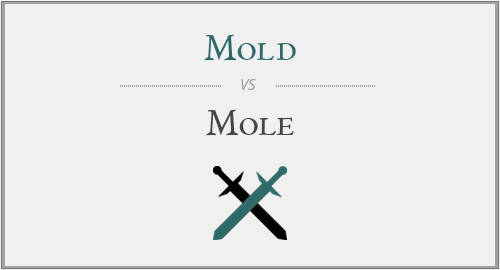Even though "mold" and "mole" may look almost identically for the simple reason of coincidence, they refer to completely different things that we are going to discuss right away! Keep reading for some more detailed explanations and illustrative examples for the similar words "mold vs. mole"!
Mold vs. Mole
"Mold" and "mole" both function as nouns in sentences - this is another similarity between them which may lead you to the false conclusion that they mean the same even if they don't.
A notable difference in this pair, anyway, is the fact that "mole" is always spelled like this, as a noun with several different significances; whereas "mold" is only spelled in this form in US English. In fact, it originates from the word "mould", which is in UK English and which can also be used as a verb. The US version, anyway, "mold", only functions as a noun - always!
When do we use "mold"?
We recommend that you only use "mold" spelled in this form if you are using US English. If you're talking to a British person, they will use "mould", because this is how they spell it in the UK. "Mold", anyway, is the shorter version preferred by US English users, a noun defining the same concept as "mould" - which is the green or black substance which grows or appears on old food or in wet places.
Example: The bread was so old that it was fully covered in mold. - "mold" is the form of the noun used in US to define the green or black substance that grows on old food.
When do we use "mole"?
Unlike "mold", "mole" is a generally accepted and commonly used noun, in any English-speaking region. The word primarily defines a small and dark mark on the skin. The same word also happens to be the name of a small mammal that has black fur, digs holes in the soil and lives underground.

More informally, a "mole" is also used when referring to someone who leaks information; for example, a person who gives other governments or organizations top secret information about the government or the organization in which they work.
Example 1: He had a distinctive mole in the shape of a heart. - "mole" defines a small and dark mark on the skin.
Example 2: Their grandmother caught a mole while it was digging in their garden. - "mole" is the name of a small, black-furred animal that lives in the ground and digs in the soil.
Example 3: We need to find the mole in our company before all our secrets are discovered. - "mole" can be used as an informal noun defining a person who shares secret information from the organization where they work.
Conclusion
The word “mole" is a noun used in all English-speaking regions with several meanings, ranging from a skin mark to the name of an animal and to a type of person; whereas "mold" is a US form of the UK noun "mould" which refers to a substance that appears in wet places or over old food.
Both words are interesting and easy to remember; but despite their similarity, as you have already observed, they have nothing in common regarding their intrinsic meanings.




Have a discussion about this article with the community:
Report Comment
We're doing our best to make sure our content is useful, accurate and safe.
If by any chance you spot an inappropriate comment while navigating through our website please use this form to let us know, and we'll take care of it shortly.
Attachment
You need to be logged in to favorite.
Log In